常见短暂性动词与延续性动词的对照一览表
短暂性动词和延续性动词
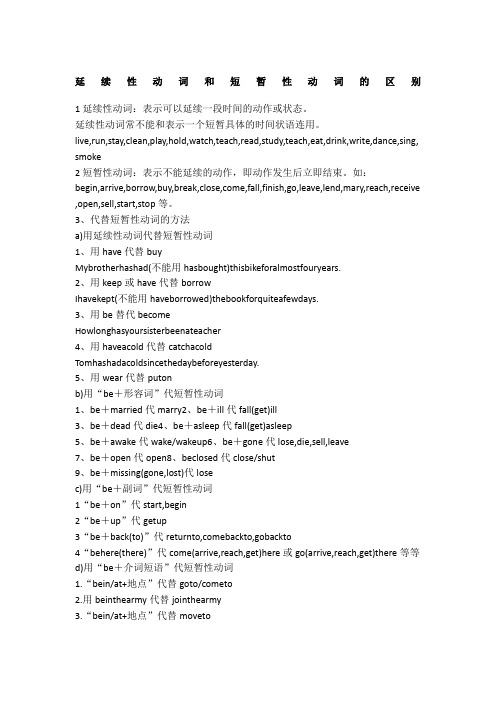
延续性动词和短暂性动词的区别1延续性动词:表示可以延续一段时间的动作或状态。
延续性动词常不能和表示一个短暂具体的时间状语连用。
live,run,stay,clean,play,hold,watch,teach,read,study,teach,eat,drink,write,dance,sing, smoke2短暂性动词:表示不能延续的动作,即动作发生后立即结束。
如:begin,arrive,borrow,buy,break,close,come,fall,finish,go,leave,lend,mary,reach,receive ,open,sell,start,stop等。
3、代替短暂性动词的方法a)用延续性动词代替短暂性动词1、用have代替buyMybrotherhashad(不能用hasbought)thisbikeforalmostfouryears.2、用keep或have代替borrowIhavekept(不能用haveborrowed)thebookforquiteafewdays.3、用be替代becomeHowlonghasyoursisterbeenateacher4、用haveacold代替catchacold Tomhashadacoldsincethedaybeforeyesterday.5、用wear代替putonb)用“be+形容词”代短暂性动词1、be+married代marry2、be+ill代fall(get)ill3、be+dead代die4、be+asleep代fall(get)asleep5、be+awake代wake/wakeup6、be+gone代lose,die,sell,leave7、be+open代open8、beclosed代close/shut9、be+missing(gone,lost)代losec)用“be+副词”代短暂性动词1“be+on”代start,begin2“be+up”代getup3“be+back(to)”代returnto,comebackto,gobackto4“behere(there)”代come(arrive,reach,get)here或go(arrive,reach,get)there等等d)用“be+介词短语”代短暂性动词1.“bein/at+地点”代替goto/cometo2.用beinthearmy代替jointhearmy3.“bein/at+地点”代替moveto。
短暂性动词与延续性动词的转换
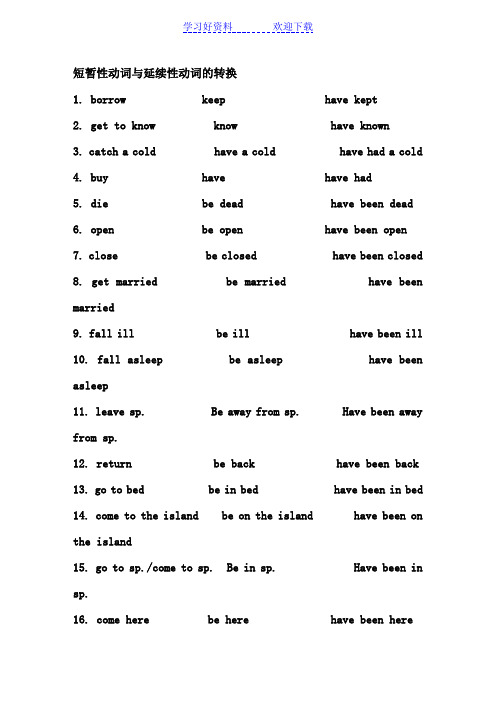
短暂性动词与延续性动词的转换1. borrow keep have kept2. get to know know have known3. catch a cold have a cold have had a cold4. buy have have had5. die be dead have been dead6. open be open have been open7. close be closed have been closed8. get married be married have been married9. fall ill be ill have been ill10. fall asleep be asleep have been asleep11. leave sp. Be away from sp. Have been away from sp.12. return be back have been back13. go to bed be in bed have been in bed14. come to the island be on the island have been on the island15. go to sp./come to sp. Be in sp. Have been in sp.16. come here be here have been here17. go there be there have been there18. go out be out have been out19. get up be up have been up20. start/ begin be on have been on21. finish/ end be over have been over22. become be have been23. join be a member of have been a member ofBe in have been inrrive→be here begin(start)→be ondie →be dead come back→be backleave →be away (from) fall ill(sick, asleep)→beill(sick, asleep)get up→be up go out →be outfinish →be over put on →wear 或be onopen →be open join →be in或 be a member of…close →be closed go to school→be a studentborrow →keep buy/get →have catch(a cold)→ have(a cold) get to know →knowbegin to study→study come to work→workmove to → live in finish/end → be overcome to → be in sit down → be seated marry → be married dress → be dressed等短暂性动词和延续性动词可以从字面上理解,持续的动作就是延续动词,反之就是瞬间动词(短暂动词),这个有这种感觉还是很好理解的,你看看下面的浅谈吧延续性动词: live,run,stay,clean,play,hold,watch,teach,read,study,teach, eat,drink,write,dance, sing,smoke瞬间性动词:open,stop,like,love,die,win,close,shot,begin,startenter,finish1、终止性动词:表示不能延续的动作,即动作发生后立即结束。
英语短暂性动词和延续性动词
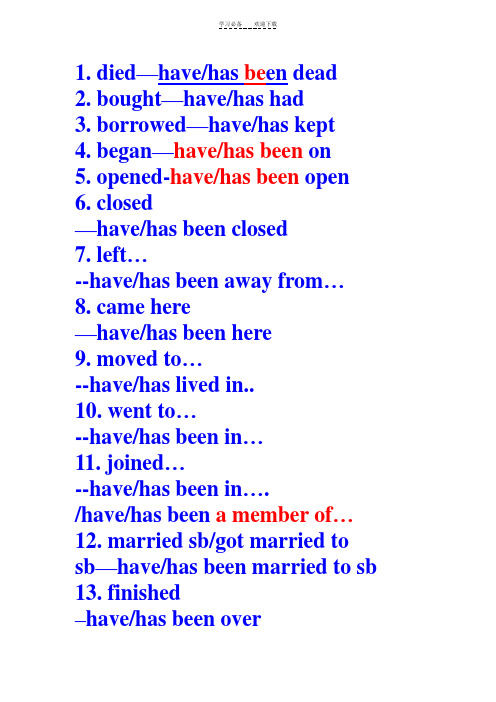
1. died—have/has be en dead2. bought—have/has had3. borrowed—have/has kept4. began—have/has been on5. opened-have/has been open6. closed—have/has been closed7. left…--have/has been away from…8. came here—have/has been here9. moved to…--have/has lived in..10. went to…--have/has been in…11. joined…--have/has been in…./have/has been a member of…12. married sb/got married to sb—have/has been married to sb 13. finished–have/has been over14. made/became friends—have/has been friends15. began to teach—have/has taught16. lose (lost)—haven’t/hasn’t had17.become (became)—have/has been ******************************* * He went to London in 1990. He is still in London now.→He has been in London since 1990. * I borrowed the book two weeks ago. →I have kept the book for two weeks/since two weeks ago.It is two weeks since I borrowed the book.●He joined the League two yearsago. = It is two years since hejoined the League.= He has been in the League for two years/ since two years ago.同义句(用两种方法变):1.The film began ten minutes ago. It is …since….It is ten minutes since the film began. The film has been on for ten minutes/since ten minutes ago.2.It is three days since he left.He left three days ago.He has been away from here for three days/since three days ago.3.He came here half an hour ago,and he is still here now.It is half an hour since he came here. He has been here for half an hour./since half an hour ago.4.Mary married Tom ten years ago. It is ten years since Mary married Tom.Mary has been married to Tom for ten years/since ten years ago.5.I began to teach English fourteenyears ago.It is fourteen years since I began to teach English.I have taught English for fourteen years/since fourteen years ago.I have been an English teacher for 14 years.Test in class1.He moved to Shenzhen two yearsago.It is two years since he moved to Shenzhen.He has lived in Shenzhen for two years/since two years ago.2.My father went to Shanghai lastweek.It is a week since my father went to Shanghai.My father has been in Shanghai since last week.3.Mike joined the army three yearsago.It is three years since Mike joined the army.Mike has been in the army for three years/since three years ago.4.It is ten minutes since the filmbegan.The film began ten minutes ago.The film has been on for ten minutes/since ten minutes ago.5.He bought the computer fourweeks ago.It is four weeks since he bought the computer.He has had the computer for four weeks/since four weeks ago.。
现在完成时中短暂性动词变延续性动词归纳表
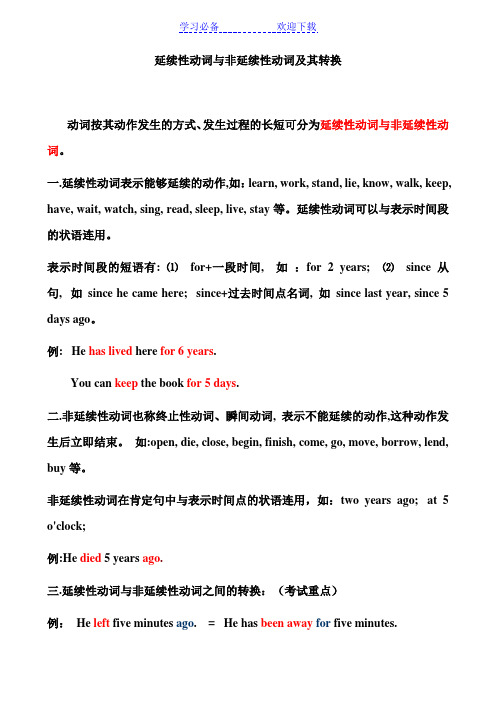
延续性动词与非延续性动词及其转换动词按其动作发生的方式、发生过程的长短可分为延续性动词与非延续性动词。
一.延续性动词表示能够延续的动作,如:learn, work, stand, lie, know, walk, keep, have, wait, watch, sing, read, sleep, live, stay等。
延续性动词可以与表示时间段的状语连用。
表示时间段的短语有: ⑴for+一段时间, 如:for 2 years; ⑵since从句, 如since he came here; since+过去时间点名词, 如since last year, since 5 days ago。
例: He has lived here for 6 years.You can keep the book for 5 days.二.非延续性动词也称终止性动词、瞬间动词, 表示不能延续的动作,这种动作发生后立即结束。
如:open, die, close, begin, finish, come, go, move, borrow, lend, buy等。
非延续性动词在肯定句中与表示时间点的状语连用,如:two years ago; at 5 o'clock;例:He died 5 years ago.三.延续性动词与非延续性动词之间的转换:(考试重点)例:He left five minutes ago. = He has been away for five minutes.这句话的意思是指他离开的动作是5分钟之前发生的,是过去时。
也就是说从他离开到现在已经有五分钟了,这个动作是延续的,要用现在完成时,并且要把原来的短暂性动词改为延续性动词。
一些短暂性动词及相应的延续性动词:arrive(get to /reach)→ be here (in)begin(start) → be ondie → be deadcome here(back)→be here(back)leave → be away (from)fall ill(sick, asleep)→be ill(sick, asleep)get up→ be upgo/ get out(there)→ be out(there)finish → be overput on → wear 或be onopen → be open(keep sth. open)join → be in或be a member of…+组织机构close → be closedgo to school → be a studentborrow →keepbuy/get →havecatch(a cold) → have(a cold)get to know → know begin to study → study come to work → work move to → live in finish → be over come to → be insit down → be seated marry → be married dress → be dressed become → be。
短暂动词和持续动词

• a. I have bought the new dress since last month. (false) • b. I have had the new dress since last month. (true)
• a. They have left for half an hour . You should come earlier. (false) • b. They have been away for half an hour. You should come earlier. (true)
arrive (at/in)--be (in/at)
get (to)-- be (in/at)
die-- be dead
close-- be closed
reach-- be (in/at)
buy-- have borrow-- keep
open-- be open
return-- be back marry-- be married
been in
buy go to got to have/has had have/has been in have/has been in have/has been in
come to
My brother has joined the army for five years.
been in
buy go to have/has had have/has been in have/has been in
come to
have/has been in borrow have/has been in begin
got to
join
have/has been in
延续性动词和短暂性动词的区别
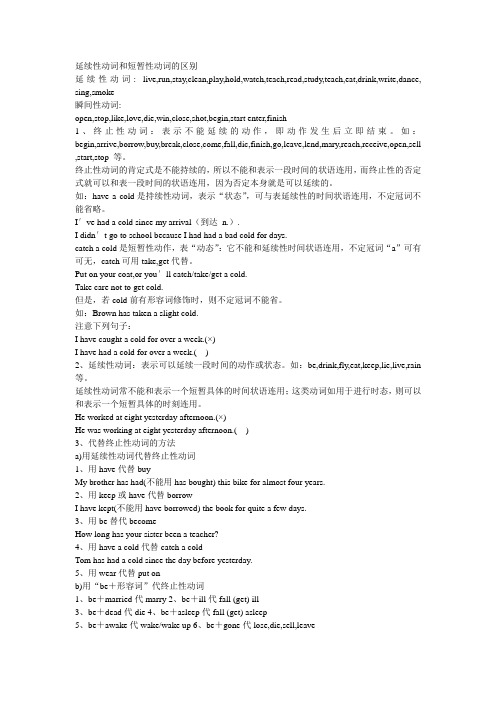
延续性动词和短暂性动词的区别延续性动词: live,run,stay,clean,play,hold,watch,teach,read,study,teach,eat,drink,write,dance, sing,smoke瞬间性动词:open,stop,like,love,die,win,close,shot,begin,start enter,finish1、终止性动词:表示不能延续的动作,即动作发生后立即结束。
如:begin,arrive,borrow,buy,break,close,come,fall,dic,finish,go,leave,lend,mary,reach,receive,open,sell ,start,stop 等。
终止性动词的肯定式是不能持续的,所以不能和表示一段时间的状语连用,而终止性的否定式就可以和表一段时间的状语连用,因为否定本身就是可以延续的。
如:have a cold是持续性动词,表示“状态”,可与表延续性的时间状语连用,不定冠词不能省略。
I′ve had a cold since my arrival(到达n.).I didn′t go to school because I had had a bad cold for days.catch a cold是短暂性动作,表“动态”:它不能和延续性时间状语连用,不定冠词“a”可有可无,catch可用take,get代替。
Put on your coat,or you′ll catch/take/get a cold.Take care not to get cold.但是,若cold前有形容词修饰时,则不定冠词不能省。
如:Brown has taken a slight cold.注意下列句子:I have caught a cold for over a week.(×)I have had a cold for over a week.()2、延续性动词:表示可以延续一段时间的动作或状态。
短暂动词对应延续性动词变化
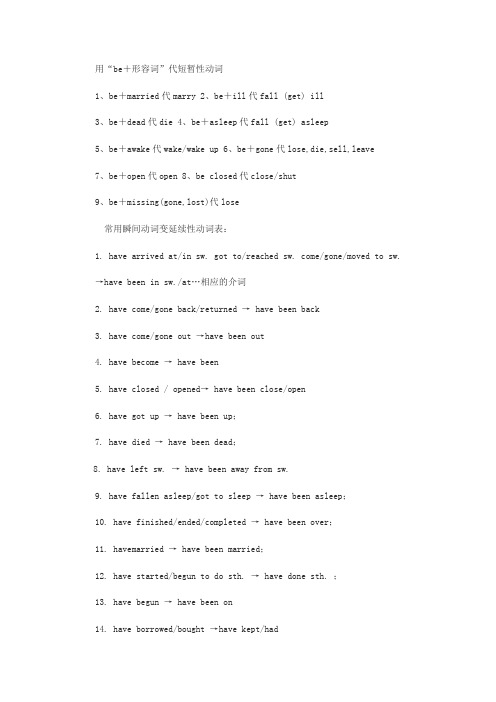
用“be+形容词”代短暂性动词1、be+married代marry2、be+ill代fall (get) ill3、be+dead代die4、be+asleep代fall (get) asleep5、be+awake代wake/wake up6、be+gone代lose,die,sell,leave7、be+open代open 8、be closed代close/shut9、be+missing(gone,lost)代lose常用瞬间动词变延续性动词表:1. have arrived at/in sw. got to/reached sw. come/gone/moved to sw. →have been in sw./at…相应的介词2. have come/gone back/returned → have been back3. have come/gone out →have been out4. have become → have been5. have closed / opened→ have been close/open6. have got up → have been up;7. have died → have been dead;8. have left sw. → have been away from sw.9. have fallen asleep/got to sleep → have been asleep;10. have finished/ended/completed → have been over;11. havemarried → have been married;12. have started/begun to do sth. → have done sth. ;13. have begun → have been on14. have borrowed/bought →have kept/had15. have lost → haven’t had16. have put on →have worn17. have caught /get a cold → have had a cold;18. have got to know → have known19. have/has gone to → have been in20. have joined/have taken part in the league/the Party/the army延续性动词与非延续性动词之间的转换:leave --- be away, borrow --- keep, buy --- have, begin/start --- be on, die --- be dead, finish --- beover, join --- be in+组织机构, be a member of+组织机构, open sth --- keep sth open, fall ill --- be ill, get up---be up, catch a cold ---have a cold, come here --- be here, go there --- be there, become--- be, come back --- be back, fall asleep --- be asleep, getto/ arrive/reach --- be (in), leave --- be away from, get to know--- know, go (get) out →be out,put on→ wear;catch a cold →have acold。
短暂性动词和延续性动词
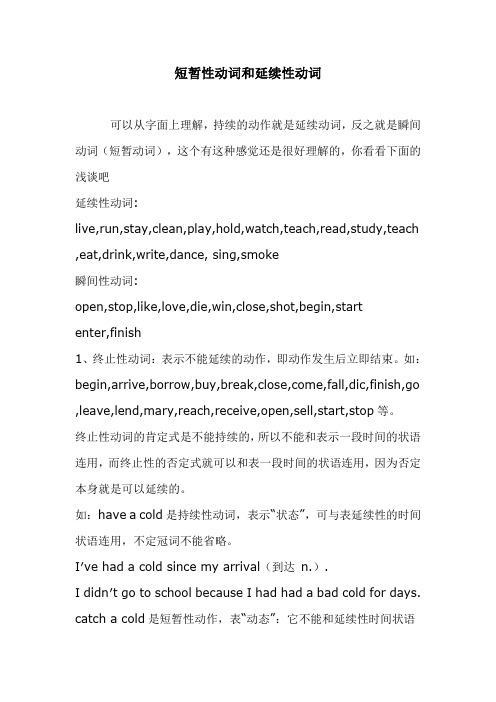
短暂性动词和延续性动词可以从字面上理解,持续的动作就是延续动词,反之就是瞬间动词(短暂动词),这个有这种感觉还是很好理解的,你看看下面的浅谈吧延续性动词:live,run,stay,clean,play,hold,watch,teach,read,study,teach ,eat,drink,write,dance, sing,smoke瞬间性动词:open,stop,like,love,die,win,close,shot,begin,startenter,finish1、终止性动词:表示不能延续的动作,即动作发生后立即结束。
如:begin,arrive,borrow,buy,break,close,come,fall,dic,finish,go ,leave,lend,mary,reach,receive,open,sell,start,stop等。
终止性动词的肯定式是不能持续的,所以不能和表示一段时间的状语连用,而终止性的否定式就可以和表一段时间的状语连用,因为否定本身就是可以延续的。
如:have a cold是持续性动词,表示“状态”,可与表延续性的时间状语连用,不定冠词不能省略。
I′ve had a cold since my arrival(到达n.).I didn′t go to school because I had had a bad cold for days. catch a cold是短暂性动作,表“动态”:它不能和延续性时间状语连用,不定冠词“a”可有可无,catch可用take,get代替。
Put on your coat,or you′ll catch/take/get a cold.Take care not to get cold.但是,若cold前有形容词修饰时,则不定冠词不能省。
如:Brown has taken a slight cold.注意下列句子:I have caught a cold for over a week.(×)I have had a cold for over a week.( )2、延续性动词:表示可以延续一段时间的动作或状态。
延续性动词和短暂性动词转换归纳
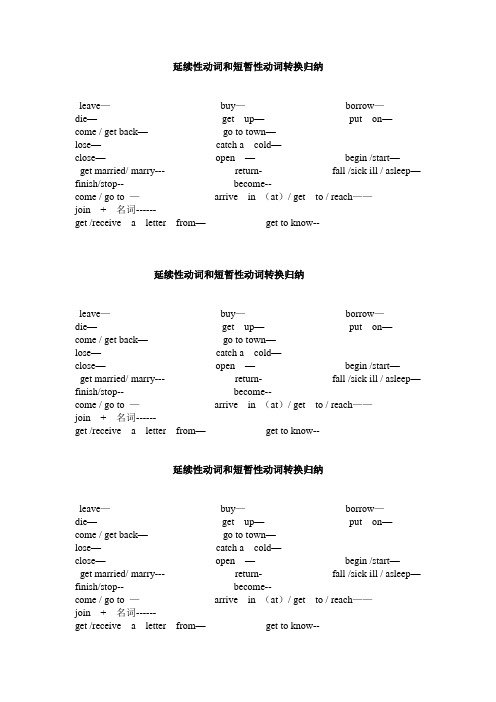
延续性动词和短暂性动词转换归纳leave—buy—borrow—die—get up—put on—come / get back—go to town—lose—catch a cold—close—open —begin /start—get married/ marry--- return- fall /sick ill / asleep—finish/stop-- become--come / go to —arrive in (at)/ get to / reach——join + 名词------get /receive a letter from—get to know--延续性动词和短暂性动词转换归纳leave—buy—borrow—die—get up—put on—come / get back—go to town—lose—catch a cold—close—open —begin /start—get married/ marry--- return- fall /sick ill / asleep—finish/stop-- become--come / go to —arrive in (at)/ get to / reach——join + 名词------get /receive a letter from—get to know--延续性动词和短暂性动词转换归纳leave—buy—borrow—die—get up—put on—come / get back—go to town—lose—catch a cold—close—open —begin /start—get married/ marry--- return- fall /sick ill / asleep—finish/stop-- become--come / go to —arrive in (at)/ get to / reach——join + 名词------get /receive a letter from—get to know--。
英语中的短暂变延续
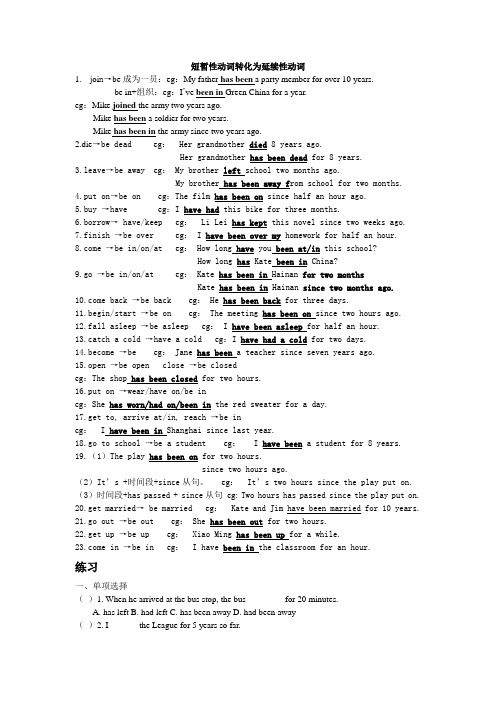
短暂性动词转化为延续性动词1.joi n→be成为一员:eg:My father has been a party member for over 10 years.be in+组织:eg:I’ve been in Green China for a year.eg:Mike joined the army two years ago.Mike has been a soldier for two years.Mike has been in the army since two years ago.2.die→be dead eg: Her grandmother died 8 years ago.Her grandmother has been dead for 8 years.3.leave→be away eg: My brother left school two months ago.My brother has been away f rom school for two months.4.put on→be on eg:The film has been on since half an hour ago.5.buy →have eg:I have had this bike for three months.6.borrow→ have/keep eg: Li Lei has kept this novel since two weeks ago.7.finish →be over eg: I have been over my homework for half an hour.e →be in/on/at eg: How long have you been at/in this school?How long has Kate been in China?9.go →be in/on/at eg: Kate has been in Hainan for two monthsKate has been in Hainan since two months ago.e back →be back eg: He has been back for three days.11.begin/start →be on eg: The meeting has been on since two hours ago.12.fall asleep →be asleep eg: I have been asleep for half an hour.13.catch a cold →have a cold eg:I have had a cold for two days.14.become →be eg: Jane has been a teacher since seven years ago.15.open →be open close →be closedeg:The shop has been closed for two hours.16.put on →wear/have on/be ineg:She has worn/had on/been in the red sweater for a day.17.get to, arrive at/in, reach →be ineg: I have been in Shanghai since last year.18.go to school →be a student eg: I have been a student for 8 years.19.(1)The play has been on for two hours.since two hours ago.(2)It’s +时间段+since从句。
短暂性动词与延续性动词

• 19. Where ______ you ______? The meeting has already begun.
• 20. Where ______ he ______? I can’t find him anywhere.
Beijing _____ three years.
4. His company opened in 2003. (同义句)
His company _____ _____ _____ since
2003.
5. My father bought the car half a year ago. (同义句)
you ______?
• 4. Tom and Mary have just come in. They ______ to a party.
• 5. Tom and Mary aren’t here. They ______ to a Party.
.
7
• 6. My father ______ to New York. He left this morning.
• The factory _______ _____ ______ for ten years.
.
4
3. John left Beijing three years ago. (同义
句)
Three years _____ _____ ______ John
_____ Beijing.
John_____ ______ ______ ______
of…
borrow →keep
短暂性动词转换成延续性动词

短暂性动词转换成延续性动词arrive in/at;get to;reach----------have/has been in/athave/has been here/therecome/go------- have/has been in/atmove------ have/has been in/atcome back/go back/return-------- have/has been backcome/go out-------- have/has been outbecome-------- have/has beenclose-------- have/has been closedopen---------- have/has been openget up--------- have/has been updie---------- have/has been deadleave--------- have/has been away fromfall asleep-------- have/has been asleepfinish/end------- have/has been overbegin/start-------- have/has been onmarry/get married----- have/has been marriedborrow------ have/has keptbuy-------- have/has hadstart/begin to do-------- have/has donelose-------- have/hasn’t hadput on------have /has worncatch/get a cold------ have/has had a coldget to know----------have/has knownhave gone to-------- have/has been injoin the club------- have/has been in the cluba member of the clubfall ill-------- have/has been ill1.He -------the English-Chinese dictionary for about twenty years,but it is still new.A.has boughtB.has borrowedC.has had2.Simon -------the Football Club since last year.A.has been inB.has joinedC.has been a member ofD.A&C3---.May I speak to your father?--.Sorry,he --------Shanghai.A.has been inB.has been toC. has gone toD. come to同义句转换1.He got to Beijing five minutes ago.He______ ________ _______Beijing for _______ _______.2.I moved to the USA last year.I _______ _______ _______the USA since _______ _______3.I went home yesterday.I _______ _______ _______home for _______ _______4.They came here last week.They _______ _______here since _______ _______5.He went out two hours ago.He _______ _______ _______for _______ _______.6.We returned to Fuzhou last week.We _______ _______ _______ to Fuzhou since _______ _______.7.I became a teacher in 2003.I _______ _______ a teacher for _______ _ ______8.He left China yesterday.He _______ _______ _______ _______ China since _______.9.The shop closed two hours ago.The shop _______ _______ _______ for _______ _______.10.The door opened at six in the morning.The door _______ _______ _______ for six hours.11.I got up two hours ago.I _______ _______ _______ Since _______ _________ ________.12.My grandpa died in 2002.My grandpa _______ _______ _______ for _______ _______.13.The meeting finished/started harf an hour ago.The meeting _______ _______ _______ for half an hour.14.I got to sleep two hours ago.I _______ _______ _______ since _______ _______.15.They married/got married in 1990.They _______ _______ _______ since _______.16.I began to teach at this school in 1995.I _______ _______at this school since 1995.17.The film began five minutes ago.The film _______ _______ _______ for _______ _______.18.They borrowed the book last week.They _______ _______ the book since _______ _______.19.I bought a pen two hours ago.I _______ _______ a pen for _______ _______.20.I got to know him last year.I _______ _______him since _______ _______.21.I put on my glasses ten years ago.I _______ _______ my glasses for _______ _______.22.My father lost his watch three days ago.My father _______ _______ his watch for three days.23.She caught a bad cold last week.She _______ _______ _______ _______ _______ since _______ _______.24.He has gone to Beijing.He _______ _______ _______ Beijing for two days.25.He joined the league in 2002.He _______ _______ a _______ _______ for two yesrs.He _______ _______ a _______ _______the _______ for two years.He _______ _______ _______ the league for two years.26.My brother joined the army two years ago.My brother _______ _______ a _______ since _______ _______ _______. My brother _______ _______ in _______ _______ since _______ _______ _______.。
短暂性动词与延续性动词

• 11. The young man ______ to Beijing. He is working there now. • 12. The students ______ to the cinema to see a film today. Now they are back. • 13. Tom isn’t at home. He ______ to school. • 14. Mr. and Mrs. Smith ______ to London now. • They ______ there twice already. • 15. Mr. Smith ______ to Britain and France this year. Now he is telling his students about his trip.
of…
borrow →keep come → be in
buy/get →have
marry → be married
习题
• 1. Mr. Li began to teach English in this school in 1999.(同义句) • Mr. Li ______ _______ English in this school since 1999. • 2. The factory opened ten years ago.(同 义句 • The factory _______ _____ ______ for ten years.
• 16. All the students ______ to the meeting to listen to a lecture. • 17. Where is Jerry? • He isn’t here now. He ______ to the library to borrow books. • 18. Miss Li ______ never ______ to China before. • 19. Where ______ you ______? The meeting has already begun. • 20. Where ______ he ______? I can’t find him anywhere.
英语短暂性动词和延续性动词
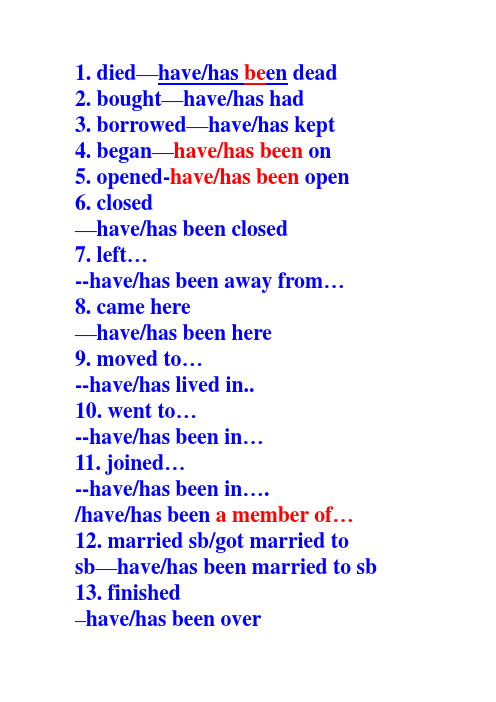
1. died—have/has be en dead2. bought—have/has had3. borrowed—have/has kept4. began—have/has been on5. opened-have/has been open6. closed—have/has been closed7. left…--have/has been away from…8. came here—have/has been here9. moved to…--have/has lived in..10. went to…--have/has been in…11. joined…--have/has been in…./have/has been a member of…12. married sb/got married to sb—have/has been married to sb 13. finished–have/has been over14. made/became friends—have/has been friends15. began to teach—have/has taught16. lose (lost)—haven’t/hasn’t had17.become (became)—have/has been ******************************* * He went to London in 1990. He is still in London now.→He has been in London since 1990. * I borrowed the book two weeks ago. →I have kept the book for two weeks/since two weeks ago.It is two weeks since I borrowed the book.●He joined the League two yearsago. = It is two years since hejoined the League.= He has been in the League for two years/ since two years ago.同义句(用两种方法变):1.The film began ten minutes ago. It is …since….It is ten minutes since the film began. The film has been on for ten minutes/since ten minutes ago.2.It is three days since he left.He left three days ago.He has been away from here for three days/since three days ago.3.He came here half an hour ago,and he is still here now.It is half an hour since he came here. He has been here for half an hour./since half an hour ago.4.Mary married Tom ten years ago. It is ten years since Mary married Tom.Mary has been married to Tom for ten years/since ten years ago.5.I began to teach English fourteenyears ago.It is fourteen years since I began to teach English.I have taught English for fourteen years/since fourteen years ago.I have been an English teacher for 14 years.Test in class1.He moved to Shenzhen two yearsago.It is two years since he moved to Shenzhen.He has lived in Shenzhen for two years/since two years ago.2.My father went to Shanghai lastweek.It is a week since my father went to Shanghai.My father has been in Shanghai since last week.3.Mike joined the army three yearsago.It is three years since Mike joined the army.Mike has been in the army for three years/since three years ago.4.It is ten minutes since the filmbegan.The film began ten minutes ago.The film has been on for ten minutes/since ten minutes ago.5.He bought the computer fourweeks ago.It is four weeks since he bought the computer.He has had the computer for four weeks/since four weeks ago.。
短暂动词和延续性动词
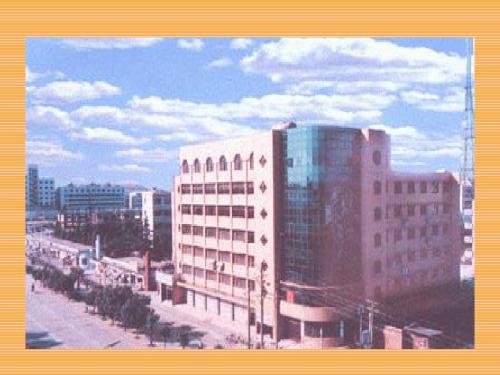
Mr. Wang has
The film has
been in been in been on been on
Beijing since five days ago.
Beijing for
five days.
6. The film began ten minutes ago. for ten minutes .
time. We haven’t seen him since 1992. She hasn’t left home all her life.
3、还可改用一般过去时来表达.
e.g. He came back a week ago.
4、也可用“It is ﹢一段时间﹢since…”句 型
来表达.
e.g. It is a week since he came back.
短
暂
性
动
词
和 延 续 性 动 词
短暂性动词也称做终止性动词、非延续性动词 或瞬间动词,表示动作不能延续,只是一瞬间就 结束的动作.
常见的短暂性动词有:come, go, arrive, reach, see, hear, close, open, leave, begin, start, lose, buy, fall, join, die, become, borrow, get up等.
②、转换成 be﹢名词; join the Party ------ be a Party member, join the army ------ be a soldier,
go to school ------ be a student.
③、转换成be + 介词短语 : go to school ------ be in school,
